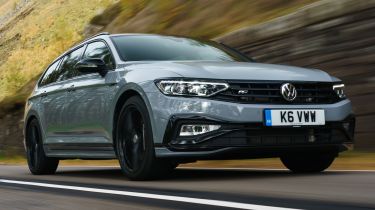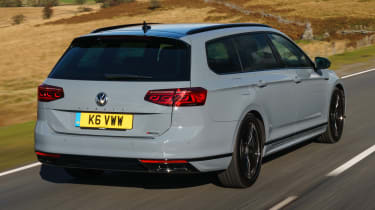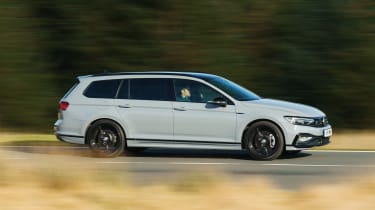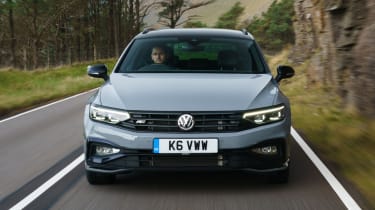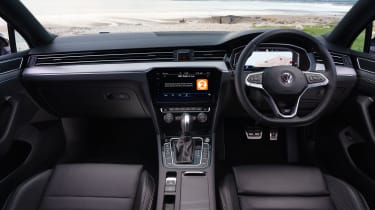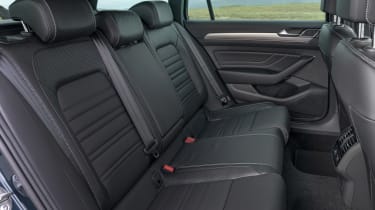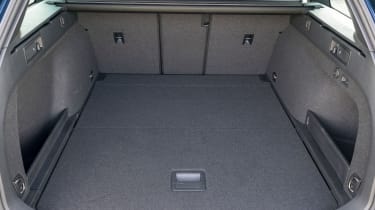Volkswagen Passat Estate (2015-2024) review
The VW Passat Estate is a refined, comfortable and hugely versatile family car

This is a review of the 2015-2024 Volkswagen Passat Estate. If you are interested in information about the latest Volkswagen Passat, or news about the latest Volkswagen models, please follow the links provided.
In some ways, the Volkswagen Passat Estate sits in a sector all of its own – it's slightly more upmarket than rivals like the Skoda Superb Estate and Toyota Corolla Touring Sports, but not quite at the level of models such as the BMW 3 Series Touring or Mercedes C-Class Estate. That means it's a great choice for those who are looking for something relatively classy, but their budget won't stretch to a prestige brand.
They won't be disappointed with the Passat Estate, because it's well built, has a comfortable interior, plenty of space for rear passengers and a big boot. However, rivals offer even more space and lots more style.
About the Volkswagen Passat Estate
The Volkswagen Passat is one the longest-serving models in the German firm’s line-up, having entered production in the seventies, and there’s been an estate car version for almost as long. The current eighth-generation Passat arrived in 2015, was facelifted in 2019 and is now available exclusively in wagon form after the traditional saloon was axed in 2022.
Used - available now

2024 Volkswagen
Passat
23,737 milesAutomaticPetrol1.5L
Cash £19,642
2024 Volkswagen
Passat
9,843 milesAutomaticPetrol1.5L
Cash £24,300
2024 Volkswagen
Passat
12,855 milesAutomaticPetrol1.5L
Cash £20,900
2024 Volkswagen
Passat
13,366 milesAutomaticPetrol1.5L
Cash £24,900At launch, the Passat’s engine range consisted of 1.6- and 2.0-litre TDI diesels, along with 1.4-, 1.8- and 2.0-litre TSI petrols. However the line-up was also slimmed down in 2019, and now consists of the 1.5-litre TSI petrol, 2.0 TDI diesel and plug-in hybrid GTE model. The GTE’s low emissions and pure-electric driving range should appeal the most to company car drivers, but the majority of buyers will still be best-served by the smooth and economical diesel.
A seven-speed DSG automatic gearbox is fitted as standard to the petrol, and is an option alongside a six-speed manual on diesel models. Meanwhile, the plug-in hybrid Passat GTE features a 1.4-litre petrol engine paired with an electric motor and 13kWh battery pack.
A number of the Passat Estate’s traditional family car rivals are no longer with us, including the Ford Mondeo Estate and Vauxhall Insignia Sports Tourer. However, remaining competitors like the Peugeot 508 SW and Skoda’s Octavia Estate and Superb Estate have all followed in VW’s footsteps and taken a step upmarket in order to retain their appeal. The Skoda and Peugeot are also still offered in both saloon and estate form, unlike the VW.
Given that the Passat has grown in quality, refinement and price, it must also compete against executive estates like the BMW 3 Series Touring, Audi A4 Avant, Mercedes C-Class Estate and Volvo V60. The Passat gets close to these cars in a few areas, but isn't quite at the same level.
The Passat’s trim structure has also changed several times since the latest B8-generation arrived, but it’s now offered in SE Nav, SE L and R-Line trims, along with the GTE and GTE Advance models; prices start from around £35,000.
An off-road-style version of the Passat, known as the Alltrack, was fitted with a rugged bodykit and the brand’s 4Motion four-wheel drive system. However, this was axed in 2020 due to poor sales. 4Motion all-wheel drive was also fitted as standard to diesel models in R-Line trim, but this too is no longer available.
Engines, performance and drive
The Passat has never been the most thrilling car to drive, and that’s even more true with the Estate. However, the eighth-generation Passat is now based on the much-used MQB platform. It forms the basis of many VW Group cars – from the Golf hatchback and Skoda Octavia Estate through to the posh Audi A3 – and as such, the Passat Estate is a far better car to drive compared with the models that have come before.
VW’s engineers have managed to shed 85kg from the old Passat Estate, which has helped the car’s handling and fuel consumption by quite some margin. Like the Saloon, the Estate has also been made more rigid so this, along with the weight savings, has made the car far more agile on the road.
Behind the wheel, the Passat feels similar to the Superb in the way it drives. The steering is precise, while the damping also delivers great body control. However, with a shorter wheelbase than the Superb, the ride is slightly less settled over more rolling, bumpy roads. There really isn’t much in it, and the VW serves up a decent level of comfort.
We suggest adding the adaptive dampers that come as part of VW’s Dynamic Chassis Control option. It costs around £1,000 extra, but the result is that the ride is soft in Comfort mode and offers plush damping, while in Sport mode it sharpens the chassis.
Take it easy, and the Passat is supremely refined. There’s very little engine noise, and the suspension soaks up lumps and bumps in town well. Head for the motorway, and the soft suspension, minimal tyre and engine noise and user-friendly standard adaptive cruise control combine to make the car an excellent long-distance cruiser.
The Passat GTE has a name and styling cues to invoke ideas of VW's GTI badge, but it doesn't feel all that sporty in corners. The hybrid set-up’s extra weight can be felt, and there’s plenty of body roll. It’s a quiet cruiser and is comfortable on long trips, though, and the suspension soaks up bumps reasonably well, although it’s not quite as good as the standard car.
0-62mph acceleration and top speed
The Passat Estate was previously available with a variety of diesel engines, but the best-selling 148bhp 2.0 TDI is now the only oil-burner on the price list. The power is backed up by a broad spread of torque: 340Nm of pulling power is available between 1,600-3,000rpm. This engine can be paired with either a six-speed manual or seven-speed DSG dual-clutch auto. 0-62mph takes 9.1 seconds in both manual and automatic guise and the top speed is 132mph.
Similarly, the petrol engine selection used to consist of 1.4-, 1.8- and a 2.0-litre TSI units, but now the only choice is a 148bhp 1.5-litre TSI. It’s only slightly quicker than the diesel, taking 8.9 seconds to reach 62mph, while the 132mph top speed is unchanged.
Thanks to the petrol engine’s 250Nm of torque, which is available from as little as 1,500rpm, you can almost drive it like a diesel, with early upshifts. It’s smooth, too, and while you may hear a slight resonance when the cylinder-deactivation kicks in, for the most part you’ll only become aware of that when the indicator on the instrument panel lights up.
Meanwhile the GTE is a fast hybrid rather than an eco-friendly GTI alternative. It's fast in a straight line and very refined, but isn't thrilling through the bends or as sporty as its GTE badges would suggest. It’s still the quickest Passat you can buy, though – 0-62mph takes 7.9 seconds and it’ll hit a top speed of 138mph.
MPG, CO2 and Running Costs
In SE Nav and SEL trim, the petrol Passat Estate returns up to 44.1mpg on the WLTP combined cycle, while the TDI diesel can achieve 58.9mpg. The latter figure remains the same whether you choose the six-speed manual or seven-speed DSG automatic. Moving up to R-Line adds bigger alloy wheels, so this sees the TSI’s economy drop slightly to 42.8mpg and the TDI’s decrease to 56.5mpg.
The TSI’s CO2 emissions start from 146g/km and rise to 150g/km in R-Line trim. It’s a similar story for the TDI, which emits 126-127g/km in base spec and 130g/km if you opt for the R-Line model.
For the really frugal-minded company car drivers, the petrol-powered plug-in hybrid GTE is the way to go. According to Volkswagen, the Passat Estate GTE can return up to 235.4mpg, emits 27g/km of CO2 and can cover up to 37 miles on battery power alone – or 42 miles if you’re only driving in town.
Because it emits significantly less CO2, the PHEV sits in the 12-per cent Benefit-in-Kind (BiK) tax band, compared with the roughly 30 per cent the petrol and diesel models attract, which could save you thousands of pounds in company car tax.
Electric range, battery and charging
The Passat Estate GTE features a 13kWh battery that allows for a pure-electric driving range of 37 miles in mixed conditions. It takes close to four hours to fully recharge the GTE’s battery using a 3.6kW home wallbox, while a regular three-pin socket will do the job in roughly five hours.
Insurance groups
Base-spec Passats with the 1.5-litre TSI or 2.0-litre TDI engine start in insurance group 20, while SEL and R-Line trim models occupy groups 21 and 22, respectively. The top-of-the-range GTE and GTE Advance sit in groups 27 and 29.
Depreciation
Retained values for the Passat Estate are strong, considering it’s a large, business-focused car. According to our latest expert data, the VW wagon will retain between 43 and 48 per cent of its original value after three years and 36,000 miles of motoring, with the Passat Estate GTE expected to perform the best.
To get an accurate valuation on a specific model check out our free car valuation tool.
Interior, design and technology
The Passat’s design is more reserved than its sportier and more stylish rivals. It’s instantly recognisable as a Volkswagen at least, but If you want a VW estate with a bit more flair, the Arteon Shooting Brake is just that. As we mentioned, though, the Passat was given a subtle nip and tuck in 2019, including tweaked bumpers front and rear.
R-Line models get a slightly sportier look and a set of 18-inch alloy wheels, then GTE versions add blue exterior accents and C-shaped LED daytime running lights. The palette of dark metallic paints on offer can make the Passat look a little underwhelming, but you can go for Lapiz Blue or Tornado Red if you want something more bold.
The Passat’s cabin isn’t flashy or standout, but it’s ergonomic and feels well built, with a quality of materials that lifts it above both the old Passat and many other cars in this sector. The simple layout is designed around the central touchscreen, which is very well positioned, while the array of the physical buttons below it and on the centre console are logically laid-out and easy to operate. The interior delivers exactly what you’d expect from a VW estate, without exceeding expectations.
Sat-nav, stereo and infotainment
Every Passat Estate is fitted with an eight-inch touchscreen running VW’s Discover Media navigation system. Although this is now a relatively old set-up, it’s still comprehensive, as well as being reasonably simple to use. If you prefer to use your favourite smartphone apps, Android Auto and wireless Apple CarPlay are both standard-fit, along with an eight-speaker sound system and USB-C charging ports.
Top-of-the-range GTE Advance models include a 10.25-inch digital driver’s display as standard, which features TFT dials, a range of trip displays and the ability to display the navigation screen between the dials if required. They also get VW’s Discover Navigation Pro sat-nav, voice and gesture control.
Practicality, comfort and boot space
By their very nature, estate cars need to be roomy, but today they must offer more than just sheer space. Thankfully, the Passat Estate has a host of versatile touches to go with its 650-litre boot capacity.
The VW’s practical features start as soon as you open the tailgate, which is unlatched via the bootlid badge – an electric tailgate costs around £700, while hands-free powered opening costs around £250. The bottom part of the latch mechanism is covered by a flap to stop it scratching items during loading, while the load cover has a useful two-stage opening.
Adding a reversing camera is another handy option that helps with positioning the Passat. The VW boot badge flips up to reveal the camera and this set-up helps keep the lens clean. Even so, it’d be nice if the Passat had larger wing mirrors to help out, too.
Size
At 4,773mm long, the Passat is actually quite compact for the class – it's smaller than the Skoda Superb Estate and outgoing Mercedes E-Class Estate. It’s actually a little shorter than the previous model, too, but the wheelbase has grown, which pays dividends for interior room and ride comfort. The Passat Estate measures 1,832mm wide and stands at 1,516mm tall.
Leg room, head room & passenger space
Passenger space is impressive, if slightly overshadowed by the Skoda Superb Estate. Still, the higher roofline means headroom is improved over the already-spacious saloon model, and there is space for three to sit abreast on the rear bench.
The wide doors make access easy and there’s plenty of legroom for the outer occupants, but the middle seat is positioned high and the transmission tunnel gets in the way a bit. Add in deep door bins, a big glovebox and decent centre console storage, and the Estate is a hugely versatile family car.
Boot
The Passat Estate has a simply enormous 650-litre boot – 120 litres more than the Peugeot 508 SW offers, and just 10 litres shy of the Skoda Superb’s 660-litre load bay. However, the GTE only has a 483-litre boot because of the battery located under the boot floor. It’s far from a small boot then, but it's a significant loss if you’re buying the Passat for its boot capacity.
Every model comes with 60:40-split seat backs, and when you fold them down, the boot capacity increases to a whopping 1,780 litres in the regular Passat Estate, while you can cram up to 1,613 litres of stuff in the GTE version.
The boot floor is mounted on runners on either side of the load bay, and it can be positioned at two levels, with the upper setting leaving a flat floor when the back seats are folded. The floor is also hinged, while flexible panels hold it in position.
There are levers in the boot to fold the back seats, while the seatbelts sit clear of the mechanism when you put the seats back. Our only real niggle with the Passat is that the boot light is mounted in the roof, so at night you need to push the load cover back to light it up.
Towing
The Passat Estate is a competent tow car, with a range of braked towing capacities starting at 1,600kg for the petrol and plug-in hybrid GTE, and going all the way up to 2,000kg when equipped with the 2.0-litre TDI diesel.
Reliability and Safety
Volkswagen is very proud of the fact that the Passat is one of its best-selling models, and undoubtedly one of the reasons for this is its strong reputation for durability. This point is also further improved on the new car thanks to the Passat Estate using the VW Group’s well proven MQB platform that underpins an ever-increasing selection of VW Group products.
This is good news, because the eighth-generation Passat is packed with new technology that adds some extra clout to the car’s arsenal when it comes to safety. The crash experts at Euro NCAP tested the latest Passat in 2014 and the VW was awarded a five-star safety rating, although that rating has since expired.
Safety kit includes adaptive cruise control, driver fatigue detection, Lane Assist, Traffic Jam Assist and Emergency Assist, plus front and rear parking sensors. Optional safety features include a hands-free parking system and rear-view camera.
The brand has a reputation for building reliable cars, and the MQB-based Passat should be relatively problem-free, but there have been a few reported cases of problems with the DSG box. And despite VW's premium image, the firm performed poorly in the 2023 Driver Power owner satisfaction survey, finishing 27th out of 32 in the best car manufacturers rankings.
Warranty
The Passat Estate comes with Volkswagen’s regular three-year/60,000-mile warranty, although there is no mileage limit for the first two years, which high-mileage drivers will enjoy. This is backed up by a three-year paintwork warranty and a 12-year body protection warranty.
An extended warranty is available, and this will extend coverage to five years or 90,000 miles, while the plug-in GTE’s battery has a separate eight-year warranty.
Servicing
Volkswagen offers a choice of either fixed 9,300-mile/one-year service intervals or variable servicing that can stretch flexibly in intervals of 18,600 miles, or two years (an indicator on the dash tells users when a service is due). The firm advises high-intensity users – those based in the city or frequently running short journeys – to take the fixed intervals, and higher-mileage motorway drivers to choose variable servicing.
A three-year fixed-price servicing plan is offered on the Passat Estate when purchasing from new, which helps to spread the cost of maintenance.

